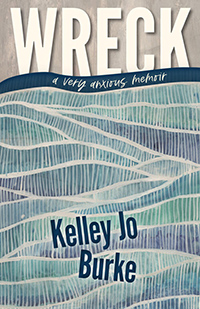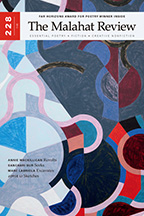Reviews
Nonfiction Review by Kate Kennedy
Kelley Jo Burke, Wreck: A Very Anxious Memoir (Regina: Radiant Press, 2021). Paperbound, 168 pp., $22.
 The first chapter of Regina playwright Kelley Jo Burke’s memoir is an
“About the Author” that begins: “You know those memoirs that
people write after they’ve chatted everything over with those concerned
and made sure everybody’s good with it, and they just want
the writer to feel free to speak their whole truth? This is not that.” It’s
the first of many reminders that this is not a tidy telling, and the author
is well aware. What it is, in part, is an on‐the‐fly schooling in the
thought patterns characteristic of diagnosed anxiety. If messiness is
off‐putting to you, I would suggest sticking around anyway, because
amid the chaos (itself often slyly charming) is a great deal of grace.
Other memoirs attempt to pinpoint home or investigate questions of
inheritance, but the book that leapt first to mind as I read Wreck was
Lucy Ellmann’s gigantic 2019 novel Ducks, Newburyport. As unlike as
the two are in volume, they share a dedication to consciousness, relaying
the interruptions and old hang‐ups and refrains that muddle linear
narrative into something much more interesting.
The first chapter of Regina playwright Kelley Jo Burke’s memoir is an
“About the Author” that begins: “You know those memoirs that
people write after they’ve chatted everything over with those concerned
and made sure everybody’s good with it, and they just want
the writer to feel free to speak their whole truth? This is not that.” It’s
the first of many reminders that this is not a tidy telling, and the author
is well aware. What it is, in part, is an on‐the‐fly schooling in the
thought patterns characteristic of diagnosed anxiety. If messiness is
off‐putting to you, I would suggest sticking around anyway, because
amid the chaos (itself often slyly charming) is a great deal of grace.
Other memoirs attempt to pinpoint home or investigate questions of
inheritance, but the book that leapt first to mind as I read Wreck was
Lucy Ellmann’s gigantic 2019 novel Ducks, Newburyport. As unlike as
the two are in volume, they share a dedication to consciousness, relaying
the interruptions and old hang‐ups and refrains that muddle linear
narrative into something much more interesting.
Wreck centres on a lighthouse, a spiritual and literal beacon. Burke’s
is located on a little piece of land called the Nubble, just north of York
Beach, Maine, where her grandparents’ cottage is and where she has
spent happy times in her childhood. The image of it has always been
a source of calm for her, but as an adult far away in the Canadian
prairies, her claim on it has become increasingly tenuous, as has her
connection to her extended family on both sides, old New England
families (the Burkes and the Adamses) with very different ideas of
themselves.
When Burke is six, her dad takes a job at the University of Manitoba.
At a physical remove from the duelling Burke/Adams lineage, the
family coalesces into a more unified identity, a dark, quirky brand of
not‐Canadian that Burke calls “Addams Family North.” The family’s
arrival in Canada is one of my favourite parts of the book. During their
bitterly cold first winter in Winnipeg, dumped outside in snowmobile
suits, Kelley Jo and her brother, Steve, seem more reminiscent of Gashlycrumb
Tinies than wholesome newcomers. Alone together, the
family revels in their antique furniture and off‐kilter sensibilities. “We
lived in the shadows, spoke like renaissance gentlemen, and would
have worked well in black and white.”
But the move sticks, and decades later, living in Regina with her
husband and children, Burke even elects to renounce her American
citizenship altogether. This is recounted in another of my favourite
scenes, a bureaucratic caper at the American embassy in Calgary that
reads something like a version of Arlo Guthrie’s “Alice’s Restaurant”
(“and they all moved away from me on the bench”).
Burke makes two noteworthy trips back to the Nubble as an adult,
one in 1996, the year after her grandmother Teen’s death. Her grandfather,
culpable insofar as he brought Teen home to the cottage when
he knew she could not live outside the hospital, is now himself in ill
health, both mental and physical. Then in 2018, Burke secures a writing
grant to return to Maine to write the memoir we hold in our hands.
Having made arrangements with the new owners to stay in the cottage,
and accompanied by her husband, Eric, Burke recounts how she
meets head‐on her expectations for the trip. These scenes are painful
and, as one might expect by this point in the book, also very funny.
Wreck is about testing theories of memory, questioning well‐meaning
attempts at tidiness. In one of the book’s last chapters, having
mocked her own project at laying claim to the Nubble and to being of
the sea, Burke concludes: “My goodness that is all a sloppy bit of curation.”
As her Auntie Pam puts it elsewhere: “Sweetie, you write it any
way you want. But it didn’t happen.” Sometimes the things we repeat
to ourselves turn out to be the least true, but repetition serves this book
well and feels of a piece with anxiousness, the moments of resolve that
turn out to be very much temporary. Among others there are the twin
refrains of Teen’s sometimes delusional‐seeming satisfaction with her
life at the cottage (“We are so happy here.”) and Grampa’s request to
be taken care of, finally: “Could I come up thay’uh and live with you?”
When he does move up to Regina, it is, naturally, quite chaotic.
Wreck will resound with anyone who has seen a beloved family
property sold, made a pilgrimage only to find the destination less than
expected, or tried to reconcile two sides of their lineage with the person
that they are—wanting it to make more sense than it possibly can.
And if Burke’s scattershot style is at times frustrating, you can almost
always hear her saying, “Yeah, tell me about it.”
—Kate Kennedy









